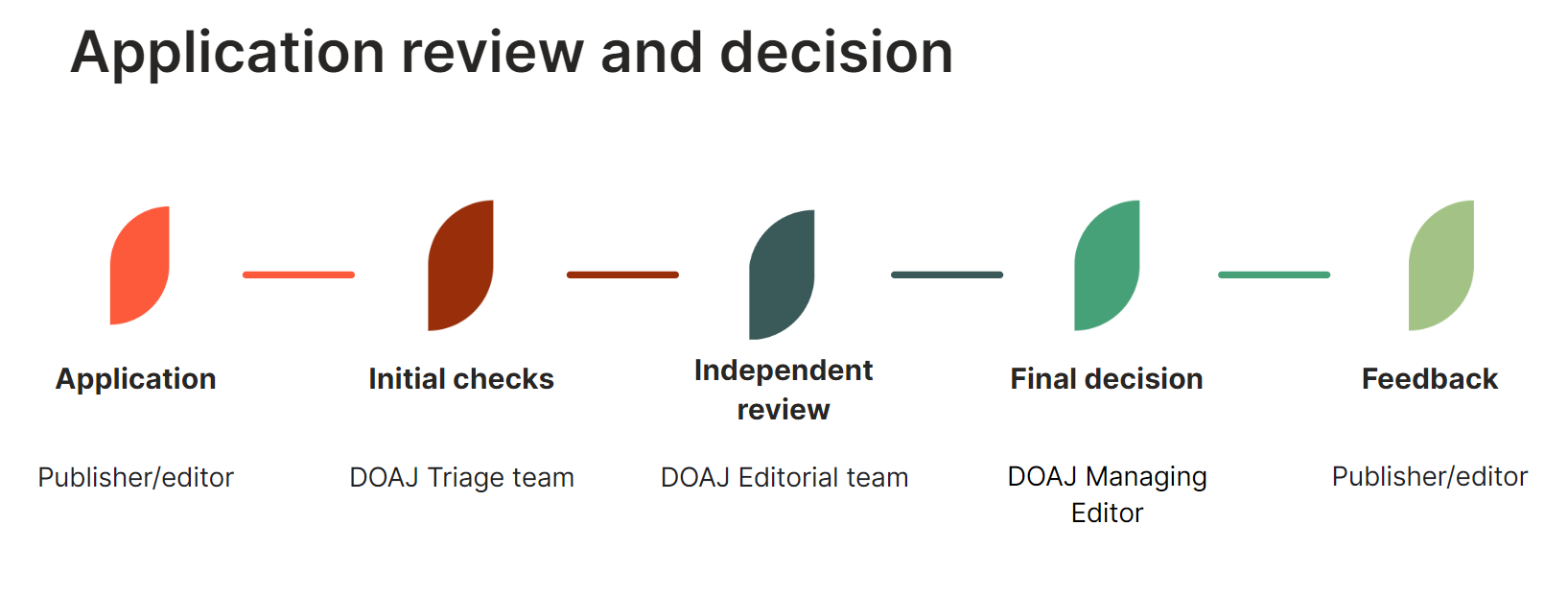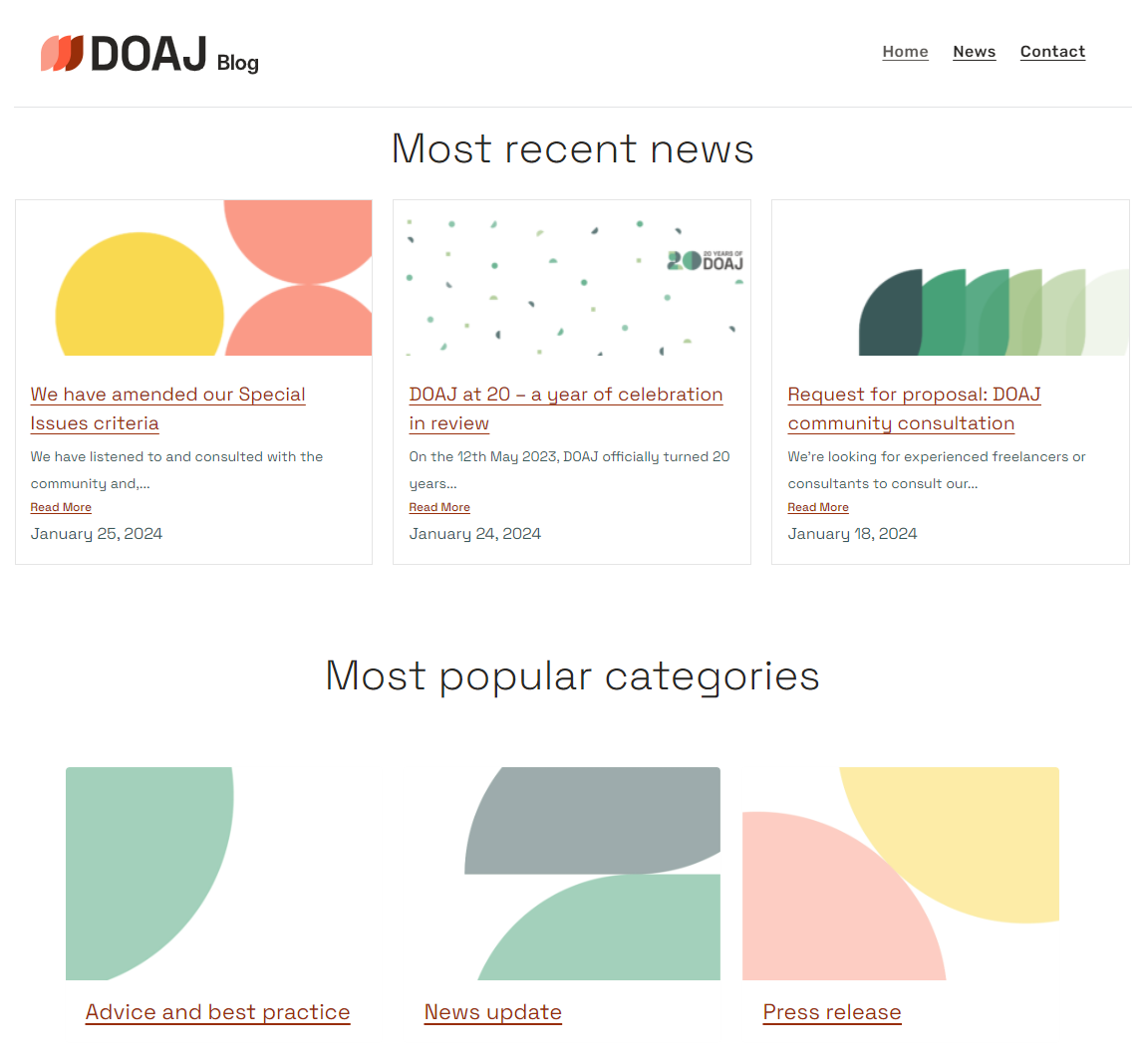DOAJ’s year ahead – DOAJ Blog
[ad_1]
Here’s a selection of what we hope to achieve in 2024. Projects include reviewing our successful Ambassador programme, a community survey discovering how our metadata can best serve our stakeholder groups, editorial developments to help us remain efficient in reviewing the increasing number of applications and journal records, a new subject classification system for journals, a new blog, and much more!
It’s an exciting time of year: we have finished our annual planning. When the team, dedicated and inspired as ours is, is part of the world’s best and most unique index, it’s a heartwarming yet frustrating process. We have to rein in our ambitions as we try to be more realistic about what we can achieve to meet our strategic goals with limited resources and funding: there is always lots to do, so prioritisation is ruthless. But now we’ve met with our tech partners, Cottage Labs, and highlighted our priority technical development tasks. Our Editorial Team has discussed and laid out plans for improved approaches to systematically reviewing and updating journals. We have approached partners with details of specific improvement projects, hoping they will sponsor them.
Below is a selection from the list of activities we have planned for this year. ‘Plan’ is the key word; year after year, we achieve a staggering amount (as illustrated in our end-of-year blog posts from 2022, 2019, or 2023), and yet unexpected tasks always show up. The list doesn’t include any of our business-as-usual tasks, such as handling around 1000 applications per month, answering the thousands of questions that come into our Help Desk, or processing and prioritising the 600 open tasks in our GitHub repository.
Outreach
We launched our ambassador programme in 2016. It has successfully increased the number of journals indexed in DOAJ worldwide, helped embed open access into mandates and policies, and raised awareness of global open access issues. The global open access environment has developed significantly since then, so we are reviewing the programme as part of our strategy to invest in and enhance our global outreach efforts to advocate for equity. We look forward to sharing the results and our plans for the programme later this year.
In April, we will send out a survey to different groups of our users to get better insights into how DOAJ is used, which parts of our journal metadata they rely on and which parts are less useful. This work will feed into a review of the metadata we display on our journal pages, with an aim to reduce the number of broken links and improve recency.
Over the years, this blog has become our most important way of communicating with our community and it’s time for a facelift! In the next couple of weeks, we will relaunch it with a new look and feel, greater accessibility and readability, and the added ability to support more varied content, such as multimedia.
Metadata
Our community relies on our metadata to surface the diverse content we index and power tools and innovations across the scholarly communications ecosystem. Our API service was established in 2016. This year, we will develop a faster API to support an ever-increasing demand on the service, which sees upwards of 1.6 million hits per day–more than 429 million hits per year–as thousands of libraries worldwide use our metadata in their collections. More publishers than ever are connected to our API, providing article metadata, updates and applications. More users are doing advanced searches.
This year, we will develop a faster API to support an ever-increasing demand on the service, which sees upwards of 1.6 million hits per day–more than 429 million hits per year–as thousands of libraries worldwide use our metadata in their collections.
We know that many users, including publishers, funders and libraries, use our metadata to identify and track journal business models. To facilitate this, we hope to develop a system of labels that we can apply to subsets of journals, for example, Subscribe to Open and Diamond. The labels will be available in the search interface and our journal CSV.
For the third year in a row, we’ve sent out Excel files to some of our largest publishing partners. This is to help them keep their metadata in our index up to date. Since we know it’s one of the most valued pieces of metadata, we offer publishers the chance to update charges information only but have also given them the chance to review and update their entire metadata corpus. We’ve added extra automation this year and we will continue building on the service to improve it.
Editorial efficiency
The number of applications we receive is higher than ever, so this year, we’re focussing a large chunk of resources on making our review processes and workflows more effective. We’re doing this in three areas.
- We will improve our backend system so that our Editorial Team and volunteers can review applications more quickly. We have already put a call out for some specialist help.
- We will investigate how automated tools and solutions can help with improved review effectiveness. This includes seeing how AI can assist us.
- We will develop and implement a quick review process for applications flagged as requiring deeper investigation. This is part of our quality control work.

Our Quality Team conducted 450 reviews into questionable publishing practices in 2023, and we know there is strong community interest in our role. As an open infrastructure, we are committed to improving transparency in all our operations and so, during 2024, we will publish the criteria we use to detect questionable or low-quality publications on our website.
Our current classification system (a static and truncated version of part of the Library of Congress Classification System) is dated, and we know from our community that this hinders the discovery of our journals. (See the work that CONSER does.) With financial support from SLUB-DRESDEN and building on research done by Information Studies students at the University of Ottawa, we have put together a number of requirements for a new taxonomy. For example, the taxonomy that we migrate to should be open-source, easy to use, adaptable, and actively maintained. We are in the middle of assessing a short list of six taxonomies, and then work will begin to scope the migration and implementation. (It is unlikely that the new taxonomy will be in use before 2025, as we will need time to do extensive checking during the migration.)
Advocacy
Throughout this year, we will continue to participate in two Horizon Europe projects to strengthen the European institutional publishing ecosystem, DIAMAS and CRAFT-OA. In particular, we’re leading the development of guidelines for institutional publishers, focussing on different disciplines and languages. As a global open infrastructure and as part of our commitment to a fairer, more inclusive, global open scholarship ecosystem, we are committed to actively developing the global federation for Diamond Open Access.
Think.Check.Submit, of which we are a founding partner and of which Dominic Mitchell, our Operations Manager, is acting Chair, continues to build on the successes of the past few years. The Committee has just finished its planning for the next two years and will soon publish a new operational plan. Among other things, we will release a Japanese translation of our new promotional video–we receive encouragingly high traffic from Japan month after month–and will focus on building those vital connections with universities and libraries to help us raise awareness of the pitfalls of predatory publishing.
The OA Journals Toolkit has now been launched for almost a year, and the Editorial Board will meet in March to prioritise items for a first round of content updates and new sections. Usage of the Toolkit has remained steady since its launch and encouragingly, downloads of the three language versions–Arabic, English and French–from our Zenodo repository are high.
We are part of a community of open infrastructures that support the scholarly publishing community. Having adopted the Principles of Open Infrastructure (POSI) in 2022, we have played an active role in shaping and revising the current principles for their relevance and longevity. One of the outcomes of our POSI review, and in line with our strategic objective to ensure our sustainability and accountability, is to work on our status in 2024 as a legal entity and our governance structure. We expect to publish our renewed commitment to the principles this year.
As one of the infrastructures selected for the pilot round of SCOSS fundraising in 2018, we remain an active member of the SCOSS family. In 2024, we are looking forward to continuing to collaborate together to share resources and find efficient ways to support our collective communities.
Project JASPER, our initiative to support diamond open access journals with their digital preservation efforts, will also continue to preserve the most vulnerable journals this year. We are excited that we have made so much progress using the resources available to us and hope to find funding from the community to underpin new developments for this vital piece of cross-organisational infrastructure.
Feature-specific funding opportunities
We hope to improve our article metadata this year by adding proper support for multiple author affiliations (and avoiding examples like this where individual authors are listed multiple times) and displaying abstracts in more than one language. With 44% of our journals being hosted on OJS, which has built-in support for multiple languages, and with our affiliation to the Helsinki Initiative on Multilingualism in Scholarly Communication, we must be better at allowing publishers to send us article metadata in many languages. If you’re interested in supporting this crucial piece of work, contact Joanna Ball, Managing Director.)
We know that creating DOAJ XML is a problem for some journals. We hope to investigate the feasibility of supporting another XML flavour, possibly JATS. It is already possible for publishers to choose between three different flavours of XML but by adding support for another XML flavour, we hope to encourage more journals to upload their metadata to us.
We would also like to redo the implementation of our OAI-PMH feed so that it contains proper information about journals and articles withdrawn from DOAJ, something that the discovery and aggregator community has been requesting for several years. We’d even like to do a KBART version of our journal CSV file.
All these projects require funding and we trying out a new approach of asking organisations to fund specific pieces of development work. In return, the funding organisation will get publicity in our comms when the feature launches and even, where appropriate, on the feature itself. If you’re interested in finding out more about any of these projects, please contact Joanna, our Managing Director.
And finally…
We are looking forward to working with the wider DOAJ community to achieve our goals and communicating our progress throughout the year. If you have any questions about anything in this post, please leave a comment or contact Dominic Mitchell, our Operations Manager.
[ad_2]
Source link


